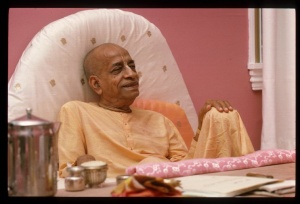SB 11.26.4: Difference between revisions
m (1 revision(s)) |
(Vanibot #0054 edit - transform synonyms into clickable links, which search similar occurrences) |
||
| (One intermediate revision by one other user not shown) | |||
| Line 1: | Line 1: | ||
{{info | {{info | ||
|speaker= | |speaker=Lord Kṛṣṇa the Supreme Personality of Godhead | ||
|listener= | |listener=Uddhava | ||
}} | }} | ||
[[Category:Srimad-Bhagavatam - Canto 11 Chapter 26|s04]] | |||
[[Category:Bhagavatam Verses Spoken by Lord Krsna - Vanisource|112604]] | |||
<div style="float:left">'''[[Srimad-Bhagavatam]] - [[SB 11|Eleventh Canto]] - [[SB 11.26: The Aila-gita|Chapter 26: The Aila-gītā]]'''</div> | |||
<div style="float:right">[[File:Go-previous.png|link=SB 11.26.3]] '''[[SB 11.26.3]] - [[SB 11.26.5]]''' [[File:Go-next.png|link=SB 11.26.5]]</div> | |||
{{RandomImage}} | |||
{{SBnotice}} | |||
==== TEXT 4 ==== | ==== TEXT 4 ==== | ||
<div | <div class="verse"> | ||
ailaḥ samrāḍ imāṁ gāthām | :ailaḥ samrāḍ imāṁ gāthām | ||
agāyata bṛhac-chravāḥ | :agāyata bṛhac-chravāḥ | ||
urvaśī-virahān muhyan | :urvaśī-virahān muhyan | ||
nirviṇṇaḥ śoka-saṁyame | :nirviṇṇaḥ śoka-saṁyame | ||
</div> | </div> | ||
| Line 17: | Line 22: | ||
==== SYNONYMS ==== | ==== SYNONYMS ==== | ||
<div | <div class="synonyms"> | ||
''[//vanipedia.org/wiki/Special:VaniSearch?s=ailaḥ&tab=syno_o&ds=1 ailaḥ]'' — King Purūravā; ''[//vanipedia.org/wiki/Special:VaniSearch?s=samrāṭ&tab=syno_o&ds=1 samrāṭ]'' — the great emperor; ''[//vanipedia.org/wiki/Special:VaniSearch?s=imām&tab=syno_o&ds=1 imām]'' — this; ''[//vanipedia.org/wiki/Special:VaniSearch?s=gāthām&tab=syno_o&ds=1 gāthām]'' — song; ''[//vanipedia.org/wiki/Special:VaniSearch?s=agāyata&tab=syno_o&ds=1 agāyata]'' — sang; ''[//vanipedia.org/wiki/Special:VaniSearch?s=bṛhat&tab=syno_o&ds=1 bṛhat]'' — mighty; ''[//vanipedia.org/wiki/Special:VaniSearch?s=śravāḥ&tab=syno_o&ds=1 śravāḥ]'' — whose fame; ''[//vanipedia.org/wiki/Special:VaniSearch?s=urvaśī&tab=syno_o&ds=1 urvaśī]-[//vanipedia.org/wiki/Special:VaniSearch?s=virahāt&tab=syno_o&ds=1 virahāt]'' — because of experiencing separation from Urvaśī; ''[//vanipedia.org/wiki/Special:VaniSearch?s=muhyan&tab=syno_o&ds=1 muhyan]'' — becoming bewildered; ''[//vanipedia.org/wiki/Special:VaniSearch?s=nirviṇṇaḥ&tab=syno_o&ds=1 nirviṇṇaḥ]'' — feeling detached; ''[//vanipedia.org/wiki/Special:VaniSearch?s=śoka&tab=syno_o&ds=1 śoka]'' — his lamentation; ''[//vanipedia.org/wiki/Special:VaniSearch?s=saṁyame&tab=syno_o&ds=1 saṁyame]'' — when he was finally able to bring under control. | |||
</div> | </div> | ||
{{SBcollapse}} | |||
==== TRANSLATION ==== | ==== TRANSLATION ==== | ||
<div | <div class="translation"> | ||
The following song was sung by the famous emperor Purūravā. When deprived of his wife, Urvaśī, he was at first bewildered, but by controlling his lamentation he began to feel detachment. | The following song was sung by the famous emperor Purūravā. When deprived of his wife, Urvaśī, he was at first bewildered, but by controlling his lamentation he began to feel detachment. | ||
</div> | </div> | ||
| Line 31: | Line 36: | ||
==== PURPORT ==== | ==== PURPORT ==== | ||
<div | <div class="purport"> | ||
This story is also narrated in the Ninth Canto of Śrīmad-Bhāgavatam. Aila, or Purūravā, was a great king whose glories were vast. On being separated from Urvaśī, he felt great bewilderment at first. But after meeting her briefly at Kurukṣetra, he worshiped the demigods with the sacrificial fire given him by the Gandharvas and received the privilege of entering the planet where she resided. | This story is also narrated in the Ninth Canto of [[Srimad-Bhagavatam|''Śrīmad-Bhāgavatam'']]. Aila, or Purūravā, was a great king whose glories were vast. On being separated from Urvaśī, he felt great bewilderment at first. But after meeting her briefly at Kurukṣetra, he worshiped the demigods with the sacrificial fire given him by the Gandharvas and received the privilege of entering the planet where she resided. | ||
</div> | </div> | ||
__NOTOC__ | </div> | ||
</div> | |||
<div style="float:right">[[File:Go-previous.png|link=SB 11.26.3]] '''[[SB 11.26.3]] - [[SB 11.26.5]]''' [[File:Go-next.png|link=SB 11.26.5]]</div> | |||
__NOTOC__ | |||
__NOEDITSECTION__ | |||
Latest revision as of 20:39, 17 February 2024

A.C. Bhaktivedanta Swami Prabhupada
Please note: The synonyms, translation and purport of this verse were composed by disciples of Śrīla Prabhupāda
TEXT 4
- ailaḥ samrāḍ imāṁ gāthām
- agāyata bṛhac-chravāḥ
- urvaśī-virahān muhyan
- nirviṇṇaḥ śoka-saṁyame
SYNONYMS
ailaḥ — King Purūravā; samrāṭ — the great emperor; imām — this; gāthām — song; agāyata — sang; bṛhat — mighty; śravāḥ — whose fame; urvaśī-virahāt — because of experiencing separation from Urvaśī; muhyan — becoming bewildered; nirviṇṇaḥ — feeling detached; śoka — his lamentation; saṁyame — when he was finally able to bring under control.
Translation and purport composed by disciples of Śrīla Prabhupāda
TRANSLATION
The following song was sung by the famous emperor Purūravā. When deprived of his wife, Urvaśī, he was at first bewildered, but by controlling his lamentation he began to feel detachment.
PURPORT
This story is also narrated in the Ninth Canto of Śrīmad-Bhāgavatam. Aila, or Purūravā, was a great king whose glories were vast. On being separated from Urvaśī, he felt great bewilderment at first. But after meeting her briefly at Kurukṣetra, he worshiped the demigods with the sacrificial fire given him by the Gandharvas and received the privilege of entering the planet where she resided.